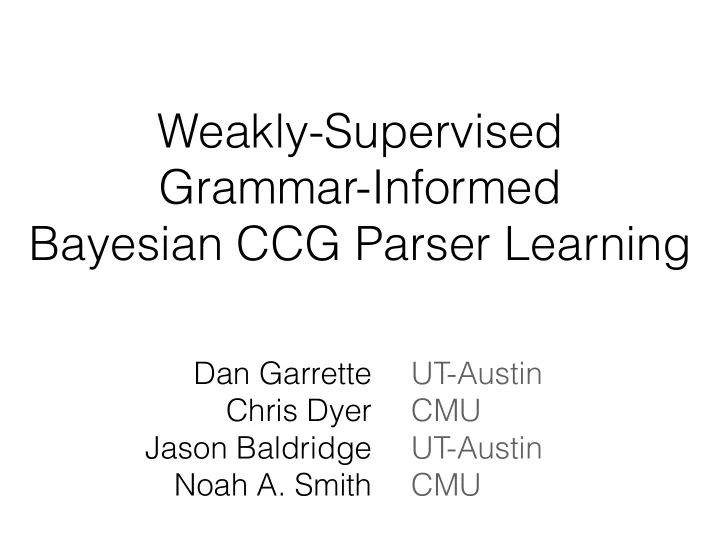

Weakly-Supervised Grammar-Informed Bayesian CCG Parser Learning Dan Garrette UT-Austin Chris Dyer CMU Jason Baldridge UT-Austin Noah A. Smith CMU
Motivation Annotating parse trees by hand is extremely difficult.
Motivation Can we learn new parsers cheaply? (cheaper = less supervision)
Motivation When supervision is scarce , we have to be smarter about data.
Type-Level Supervision
Type-Level Supervision • Unannotated text • Incomplete tag dictionary: word � {tags}
Type-Level Supervision Used for part-of-speech tagging for 20+ years [Kupiec, 1992] [Merialdo, 1994]
Type-Level Supervision Good tagger performance even with low supervision [Ravi & Knight, 2009] [Das & Petrov, 2011] [Garrette & Baldridge, 2013] [Garrette et al. , 2013]
Combinatory Categorial Grammar (CCG)
CCG Every word token is associated with a category Categories combine to form categories of larger constituents [Steedman, 2000] [Steedman and Baldridge, 2011]
CCG np np / n n the dog
CCG s np s \ np dogs sleep
Type-Supervised CCG the lazy wander dogs np/n n/n n n np np n/n (s\np)/np np/n s\np …
CCG Parsing n / n s np / n n \ np wander the lazy dogs
CCG Parsing n / n s np / n n \ np wander the lazy dogs
CCG Parsing n / n s np / n n \ np wander the lazy dogs
CCG Parsing n n / n s np / n n \ np wander the lazy dogs
CCG Parsing n n / n s np / n n \ np wander the lazy dogs
CCG Parsing n n / n s np / n n \ np wander the lazy dogs
CCG Parsing np n n / n s np / n n \ np wander the lazy dogs
CCG Parsing np n n / n s np / n n \ np wander the lazy dogs
CCG Parsing np n n / n s np / n n \ np wander the lazy dogs
CCG Parsing s np n n / n s np / n n \ np wander the lazy dogs
Why CCG? Machine Translation [Weese, Callison-Burch, and Lopez, 2012] Semantic Parsing [Zettlemoyer and Collins, 2005]
Type-Supervised CCG Type-supervised learning for CCG is highly ambiguous Penn Treebank CCGBank parts-of-speech Categories 48 tags 1,300+ categories
Our Strategy The grammar formalism itself can be used to guide learning
Our Strategy Incorporate universal knowledge about grammar into learning
Universal Knowledge
Prefer Simpler Categories np np np\(np/n) n np/n (np\(np/n))/n n np/n n/n n the lazy dog the lazy dog
Prefer Simpler Categories np np np\(np/n) n np/n (np\(np/n))/n n np/n n/n n the lazy dog the lazy dog
Prefer Simpler Categories appears 342 times in CCGbank buy := (s b \np)/np e.g. “Opponents don't buy such arguments.” buy := (((s b \np)/ pp )/ pp )/np appears once “Tele-Communications agreed to buy half of Showtime Networks from Viacom for $ 225 million.” pp pp
Prefer Modifier Categories (s b \np)/np transitive verb : (he) hides (the money) ((s b \np)/np)/((s b \np)/np) adverb : (he) quickly (hides) (the money)
Weighted Category Grammar a {s, np, n,…} p atom ( a ) × p term A B / B p term × p fwd × p mod A B / C p term × p fwd × p mod A B \ B p term × p fwd × p mod A B \ C p term × p fwd × p mod
Weighted Category Grammar a {s, np, n,…} p atom ( a ) × p term A B / B p term × p fwd × p mod + A B / C p term × p fwd × p mod A B \ B p term × p fwd × p mod + A B \ C p term × p fwd × p mod
Prefer Likely Categories s np n n / n s np np / n n s \ np wander the lazy dogs
Prefer Likely Categories s np n n / n s np np / n n s \ np wander the lazy dogs
Type-Supervised Learning unlabeled corpus same as POS tagging tag dictionary universal properties of the CCG formalism
Posterior Inference [Johnson, Griffiths, and Goldwater, 2007]
Posterior Inference Priors Inside (simple is good) the lazy dogs wander np/n n/n n n PCFG np np n/n (s\np)/np np/n s\np …
Posterior Inference Priors Inside (simple is good) the lazy dogs wander np/n n/n n n PCFG np np n/n (s\np)/np np/n s\np …
Posterior Inference Priors Sample (simple is good) the lazy dogs wander np/n n/n n n PCFG np np n/n (s\np)/np np/n s\np …
Posterior Inference Priors Sample (simple is good) the lazy dogs wander np/n n/n n n PCFG np np n/n (s\np)/np np/n s\np …
Posterior Inference Priors (simple is good) the lazy dogs wander np/n n/n n n PCFG np np n/n (s\np)/np np/n s\np …
Posterior Inference Priors (simple is good) the lazy dogs wander np/n n/n n n PCFG np np n/n (s\np)/np np/n s\np …
Posterior Inference Priors (simple is good) the lazy dogs wander np/n n/n n n PCFG np np n/n (s\np)/np np/n s\np …
Results
CCG Parsing Results 75 75 Uniform Uniform With Prior With Prior parsing accuracy 60.0 58.2 55.7 50 50 53.4 42.0 35.9 25 25 0 0 English English Chinese Chinese Italian Italian
Conclusion Using universal grammatical knowledge can make better use of weak supervision
Recommend
More recommend